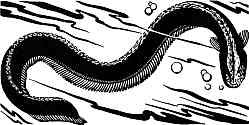|
Our
Indian friends in South America in turn eagerly sought these eels
as delicacies, but found, through bitter experience, that they could be
shocking as well as appetizing. In fact, the Indians were often knocked
down and their arms benumbed for hours as a result of being on the
receiving end of one of these electric discharges. The Indians found a
way to get around this however, and after locating a pond in which the
eels lived, they would drive two or three horses into the water.
 Infuriated at being disturbed, they would attack the animals, shooting their bolts, so to speak, and temporarily paralyzing the horses. While the eels were in this discharged state, they were easily taken by the hunters. Apparently these Indians also used them for other purposes than food for I have read that the Indians used them for their electric shock, believing it was probably a remedy for such things as headaches, paralysis and rheumatism. For many years scientists have been interested in this electricity producing organ but only recently have instruments been available for the study. A little less than two years ago scientists equipped with these modern tools added much to our knowledge. |








